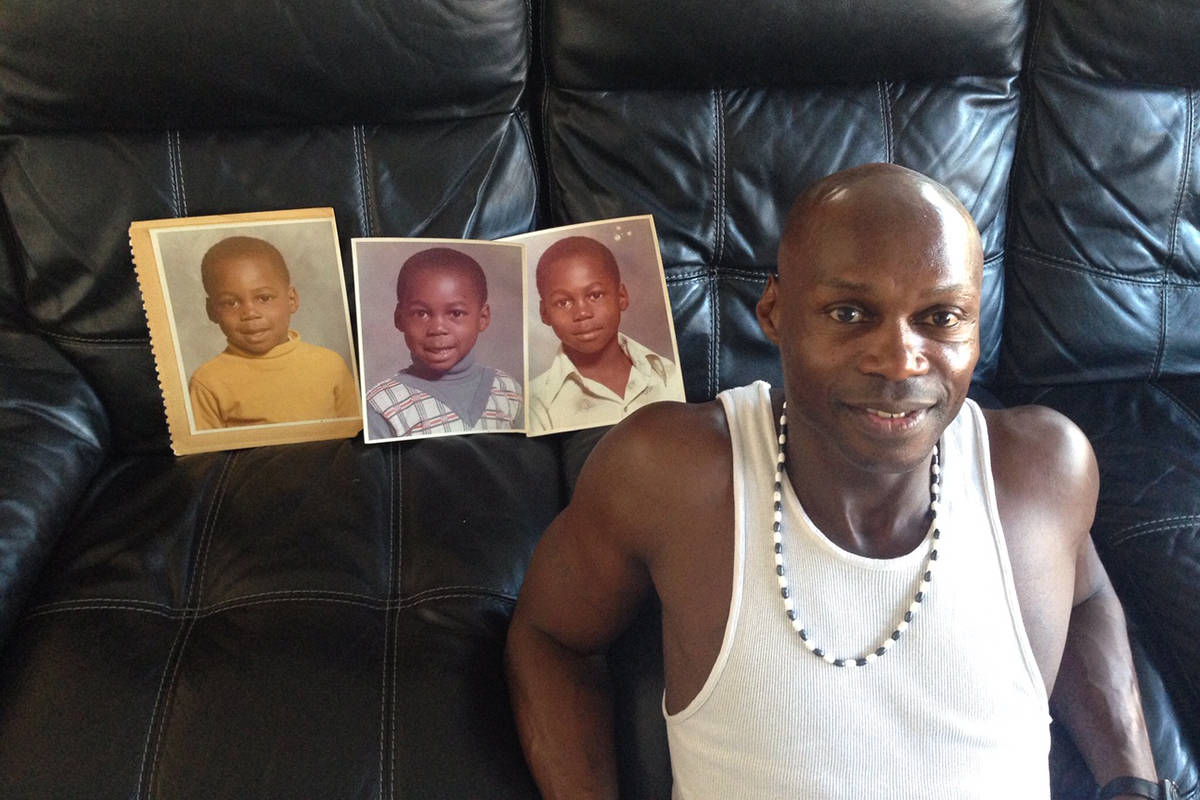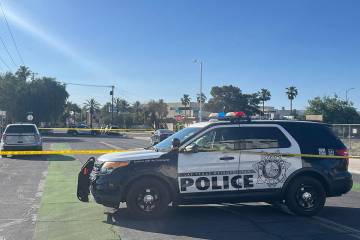Family of man who died in Las Vegas police custody preparing to file suit
A year after Byron Williams died after yelling “I can’t breathe” while a Las Vegas officer knelt on his lower back, the 50-year-old man’s family is again calling for police to release additional body-camera footage while they prepare to file a wrongful death lawsuit.
Members of Williams’ family held a virtual press conference with lawyer Antonio Romanucci on Saturday afternoon where they called for further transparency from the Metropolitan Police Department. The family is also being represented by attorney Ben Crump, who has represented dozens of families in high-profile police brutality and vigilante justice cases, including George Floyd, Breonna Taylor, Trayvon Martin, Michael Brown and Jacob Blake, according to a news release.
On Sept. 5, 2019, Williams was stopped near Martin Luther King Boulevard and Bonanza Road for allegedly riding his bicycle without safety lights, police have said. He ran from police and was then handcuffed on his stomach, and called out “I can’t breathe” at least 17 times in the body-camera footage released by police last year.
His death was ruled a homicide by the Clark County coroner’s office because a methampetamine overdose, with other significant conditions including “prone restraint,” hypertensive and atherosclerotic cardiovascular disease, pulmonary fibrosis and granulomatous lung disease.
“My brother, my cousin, was murdered by the Las Vegas Police Department for riding a bike without a light,” William’s cousin, Renee Ricks-Jones, said during the press conference. “That pain and trauma that has caused has rippled through our entire family. We want justice, we want closure, we want accountability and we want transparency.”
Four days after his death, Metro released some footage of Williams’ arrest. Family members have previously told the Review-Journal that unreleased footage shows officers dragging Williams’ limp body around a corner and dropping him on the ground while they laughed, high-fived and told him nobody was coming to help him.
There is also a 14-minute span during which police turned off their cameras while awaiting medical assistance, Assistant Sheriff Charles Hank said at a press conference on Sept. 9, 2019.
“We have to contend with that period of time where the police determined on their own, all together — in the code of silence conspiracy that we have seen throughout this county — to coordinate turning off their police cameras at the same time,” Romanucci said. “It’s left up to us. It’s left up to the family, and the attorneys, and the community to find the truth, demand justice and bring this case to a closure.”
Last year, Metro denied a Review-Journal request for all of the body-camera footage, citing the open investigation. Metro did not respond to a request for comment on Saturday.
While the attorneys wish to review the footage before filing a wrongful death lawsuit, Romanucci said that if Metro continues to withhold it, then the team will proceed with filing and “fight fire with fire.”
“Bryon in his death, I promise you, will make a difference,” he said.
Body-camera footage shows that when Williams is on the ground and first starts saying “I can’t breathe,” an officer kneeling on his lower back says, “Yeah, ‘cause you’re f—-ing tired of running.”
Williams would say “I can’t breathe” at least 17 times, the footage shows. An officer kneels on his lower back for about two minutes.
The two officers who first held Williams down have been identified as Benjamin Vasquez, 27, and Patrick Campbell, 28. Neither face any charges, and both are still on routine administrative leave, according to the attorneys’ news release.
The footage also shows Williams’ body going limp after Metro said police found two baggies of a white substance and an orange bottle with white pills. Hank said in 2019 that Williams was attempting to conceal the items.
Williams was then dragged to a patrol car to wait for paramedics.
“Where’s Byron’s voice?”
Romanucci said that in the aftermath of Williams’ death, police used his criminal history of drug convictions against him. He said that Williams’ death hasn’t gained the national attention other Black men killed by police have, because Metro hasn’t released all of the footage.
“This is what they’re allowed to do; they’re allowed to get out there and state their own narrative without the victim’s having a voice,” he said. “Where’s Byron’s voice? It’s in the grave.”
In a statement released in October 2019 after Williams’ death was ruled a homicide, then Clark County Coroner John Fudenberg said, “In this context, homicide means that the actions of another person or other people resulted in, or contributed to, the death. It is not a determination of criminal activity or wrongdoing.”
It remained unclear Saturday if Metro intends to submit the case to the Clark County district attorney’s office for review.
Fact-finding hearing set for Sept. 28
Responding to an email from the Review-Journal, District Attorney Steve Wolfson wrote that a police fact-finding review of the case is scheduled Sept. 28.
“It is at this public hearing that all the facts and circumstances surrounding the death of Mr. Williams will be presented, as required by Clark County ordinance. Witnesses will be called, and detailed information will be reviewed in this public setting,” Wolfson said in the email. “No decisions will be made with regard to the death of Mr. Williams until after the public hearing has concluded.”
During the press conference, family members spoke about Williams’ smile and sense of humor. He impressed everyone with his backflips, and taught his nieces and nephews how to ride bikes as they grew up, they said.
“We have not received any justice. We haven’t received closure — we want full accountability. We want the officers to be fired,” said Williams’ niece, Teena Acree. “My uncle, he was a person. He was loved.”
Since 1990, only two deaths in police custody have resulted in officers facing charges — the killing of Charles Bush in 1990, which led to a new state law still in place that sets limits on polices use of chokeholds, and the killing of Tashii Brown in 2017 that led to changes in Metro’s use-of-force policy. No officers in either case were convicted.
Contact Katelyn Newberg at knewberg@reviewjournal.com or 702-383-0240. Follow @k_newberg on Twitter.





























